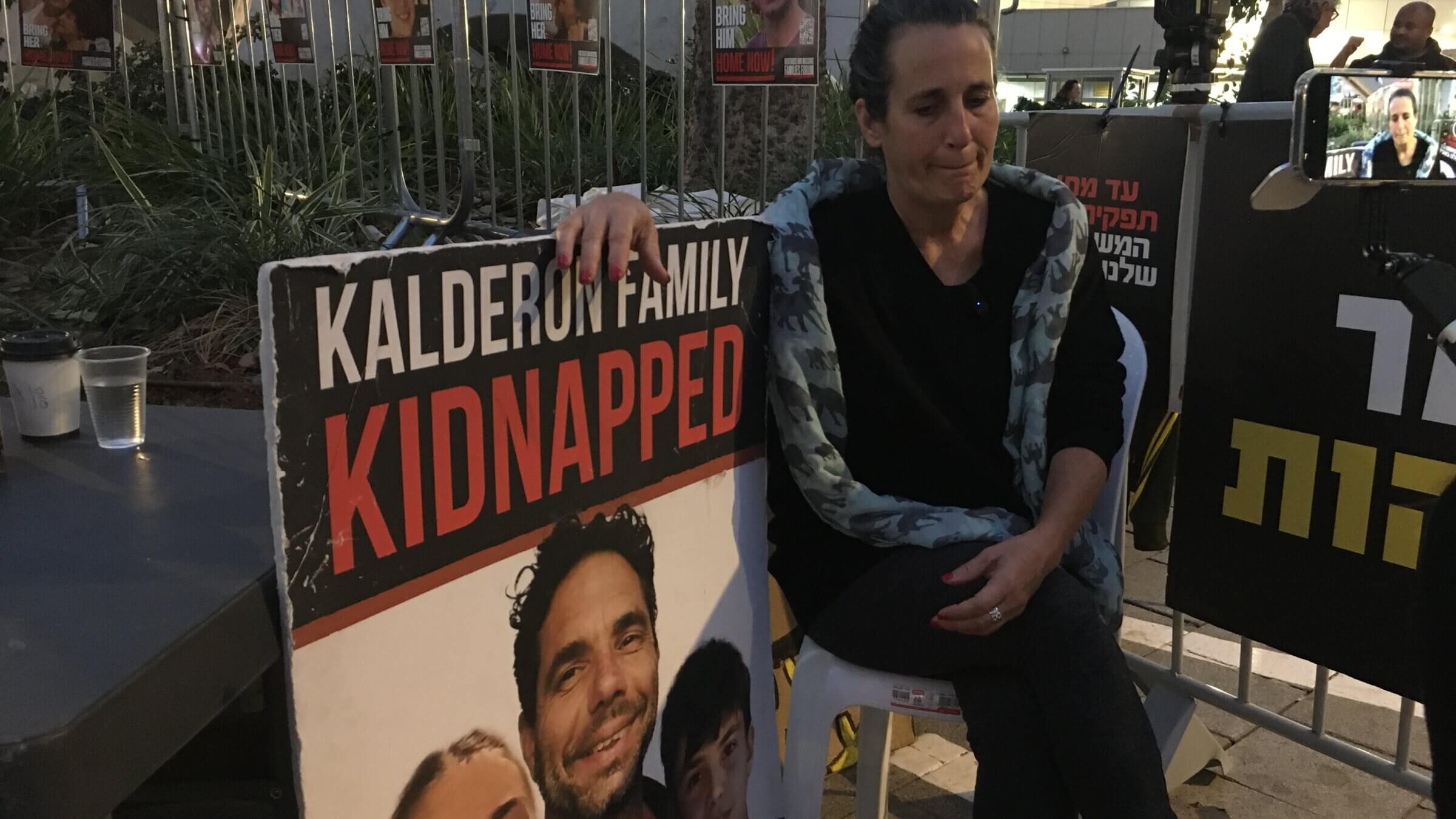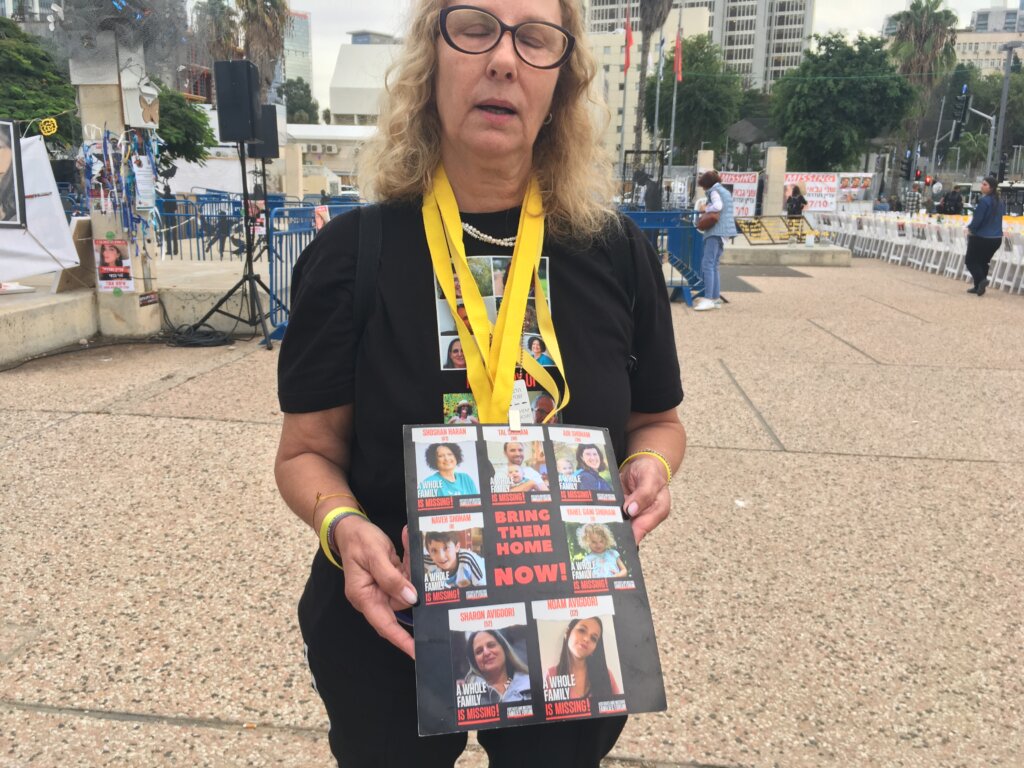‘A warm hug from grandma’: In Tel Aviv’s Hostages Square, families contemplate the expected release of 50 hostages
Relatives of those held captive in Gaza say even if their loved ones are freed, they will continue to press for those who remain captive

Hadas Kalderon Photo by Jacob Kornbluh
TEL AVIV — Hadas Kalderon looked weary Wednesday evening after giving yet another interview about her children, who had been kidnapped by Hamas on Oct. 7. With reporters from around the world, she talked about her 12-year-old son Erez and 16-year-old daughter Sahar, abducted with her ex-husband Ofer, from Kibbutz Nir Oz.
“I’m not strong, I’m weak, and that’s why I am here,” she told a TV journalist who asked from where she draws strength. To another female reporter she described her situation as “hell.”
“Have you ever seen hell?” she said. “I’m there.”
Kalderon has staked out a spot outside Israel Defense Forces headquarters, about a block from the public plaza outside the Tel Aviv Museum of Arts, which has become the focal point for civilian efforts to keep a spotlight on the hostages. For weeks the plaza, now know as “Hostages Square,” has been filled with tearful families and friends. But on Wednesday, after Israel’s cabinet approved a deal to release 50 of the more than 230 hostages held in Gaza, some dared to feel hopeful.
Dozens of yeshiva students stood in a circle and, in anticipation of mercy, sang traditional melodies of the High Holidays. On the other side of the square, the mother of a hostage abducted from the Supernova desert music festival prepared for an open-air concert in her son’s honor. Earlier in the day, the Israeli Ballet performed a 3-minute dance each hour.
And 47 days after Hamas fighters killed her mother and niece and took her children, Kalderon said she is optimistic that she will soon get to hug her son and daughter.
Under the terms of the hostage deal, Hamas will release 50 hostages over four days — mostly women and children — starting on Thursday. And the International Red Cross will be able to visit and provide medical attention to hostages who are not released. In exchange, Israel will pause its military offensive in Gaza for at least four days, and release some 150 Palestinian prisoners.
“There is some light in the dark,” Kalderon said, who is still wary that the deal will fall apart. “When I see them and hug them, hold them and kiss them, that’s when I can tell you that I am happy.”
She said Israel’s fight is not done until all hostages are home, but that the deal opens up a path for future agreements and “more trust between the two sides.”
‘The children’s lives are in real danger’
Nearby in the plaza, Nitza Korngold said the hostage deal has buoyed her family, eight of whose members are captives in Gaza: Her son Tal Shoham and wife Adi were kidnapped from Kibbutz Be’eri with their children, Nave, 8, and Yael, 3. Extended family members Shoshan Haran — her daughter-in-law’s mother — Sharon Avigdori and her 12-year-old daughter Noam are also in captivity.
“The children’s lives are in real danger,” she said. “They must come home first.”
But their freedom, she added, will not release any pressure to free those who remain, she added. “We have all become one big family,” she said. “We are fighting for each and everyone.”

Korngold lives in the Kibbutz Gvulot, about 7 miles from Gaza, which was bypassed by Hamas. She said she’s looking forward to hugging her grandkids.
“That’s what they need right now. A warm hug from grandma.”
‘Tomorrow it could happen to you’
In her corner of the plaza, Idit Ohel, the mother of 22-year-old Alon Ohel, was preparing for a piano performance dedicated to her son. Hundreds later showed up to listen to Israeli singers and songwriters Rami Kleinstein and Marina Maximilian Blumin sing for his return.
She said that Alon has a deep connection to music, particularly to piano. She set up one up in the plaza, and invited people to play. It “symbolizes that whoever plays it is showing Alon that he is not alone in this journey,” Ohel said.
Korngold said watching video of pro-Palestinian activists rip down posters of the hostages “hurts,” but that Israelis’ unified support for the captives has given their families the strength they need.
Both she and Kalderon said support from the U.S. and elsewhere has likewise girded them. But they cautioned the international community to prosecute Hamas’ “crimes against humanity.”
“Fight for us,” Kalderon said. “Fight for our children and babies, men and women and elderly. Make sure they come safe and healthy and alive. Don’t forget them. Tomorrow it could happen to you.”
















